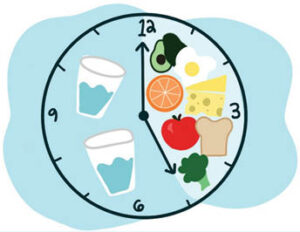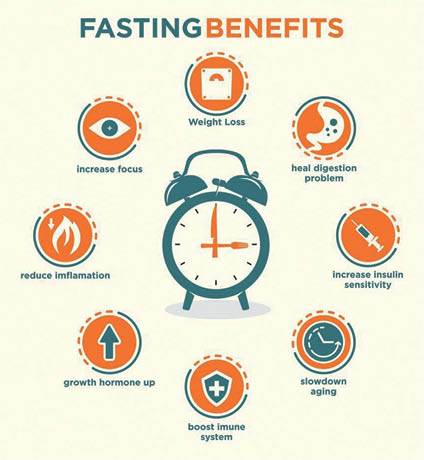Trishala Chopra is an alternative medicine specialist commanding a decade of success in managing Diabetes, Obesity, PCOD/PCOS, Metabolic Disorders, Gut-health and Sleep-disorders. As a Health Coach, Dr. Trishala empowers your body’s potential to heal itself through a balanced ‘Gut-Mind-Body’ approach so you achieve your wellness goals, while making self-care a fun and fulfilling experience. To connect with Dr. Trishala, Call/Message: (+91) 9930831317 or Email ID – drtrishalachopra@gmail.com
 Intermittent Fasting (IF) has become quite a popular option these days in reference to weight loss. But, is it just hype? Let’s get a better understanding…
Intermittent Fasting (IF) has become quite a popular option these days in reference to weight loss. But, is it just hype? Let’s get a better understanding…
Intermittent Fasting is any voluntary time-period, where you refrain from eating anything. It’s not another ‘diet’. It doesn’t specify what you have to eat, it only specifies when to eat – which is completely flexible. People panic when they hear the word ‘fasting’. They equate it to ‘starving’ and get uncomfortable with the idea.
But, consider this – when you’re asleep every night, for a good 6 – 8 hours, you’re obviously not eating, correct? That’s your daily fasting period! Which is why your first meal is termed ‘breakfast’ or breaking the fast! The gap between any two meals is your ‘fasting window’. So, literally, we pretty much fast on regular basis!
HOW DOES FASTING HELP? Some of the key benefits of It helps in:
- Weight Loss
- Reducing Triglycerides Levels
- Controlling Blood Sugar Levels For Type 2 diabetes
- Reducing Blood Pressure Naturally
- Reducing Overall Insulin Levels
- Longevity
I prescribe Intermittent Fasting under my supervision for numerous clients to address various health issues, but for now, I will focus on IF in reference to treating obesity and Type 2 diabetes. Let me start by addressing the foremost fear or discomfort that most of us harbour as regards IF – “Does IF mean I have to starve?”
The answer is a resounding NO! There is a huge difference between ‘starving’ and ‘fasting’. Starvation is involuntary absenteeism from eating. It’s not controlled. Starvation arises in people who are struggling for their livelihood or when there is a natural calamity or war or famine – there is lack of food. Fasting, on the other hand, is a voluntary choice – either for religious or health reasons. Food is readily available but you consciously choose to refrain from eating. Comparing Fasting to Starving is like comparing a person running for a marathon versus one running to save his life from a tiger!
Fasting is as old as humankind – so how did things get lost in translation? How did we move from fasting to constantly eating through the day? I see these statements everywhere – newspapers, magazines, social media… ‘You must eat your breakfast every day’ or ‘You should never keep long gaps between your meals’ or ‘You must eat every two hours’, ‘You should never miss a meal’, etc. We hear these statements so frequently that we start believing this is the truth! We feel compelled to have breakfast. Some patients request me to prescribe them food every hour, else they feel acidic through the day! The Food industry and Medical industry have completely overtaken us – our beliefs have become far removed from the truth.
Even as you are pondering these statements, I’d like to give you some more ‘food for thought’… During human evolution, there were no clocks – we didn’t eat food according to the time. There weren’t any fixed timings to eat.
Basic Kinds Of Intermittent Fasting…
- Time-Restricted Eating (TRE): Fasting for less than 24 hours i.e., going without food for less than 24 hours.
- Short-Term Fasting: Fasting for anywhere between 24 to 36 hours i.e., going without food for 24-36 hours.
- Alternate Day Fasting: Eating for 1 whole day and then skipping a meal for the next whole day.
- Long-Term Fasting: Fasting for more than 36 hours i.e., going without food for more than 36 hours
To many, these many hours without food must seem like an impossible task! If we are unable to stay without food for even 8 hours, how can we fast for a whole day? It’s natural to feel this way. When I attempted my first fast, I felt I was going on a battlefield. But after completing it, I felt like I won the battle! What motivated me to keep doing this was the way I felt after completing the fast!
My patient, Firuza Mehta (name changed), was in her mid-30’s when she came to me; she was struggling with numerous health issues. She had tried almost everything to get better. Her health history showed she was suffering from indigestion (bloating and acidity), unexpected weight gain, high blood sugar and cholesterol levels, high Uric acid and liver enzymes, high BP due to weight gain… this despite being on various medications to treat all these issues! She felt she was doing everything right – following the ‘guidelines’ to the tee – yet, things weren’t improving.
When she came to me, she was consuming nearly 8 – 10 meals per day. She was told not to skip her meals because she had to take medicines. Imagine, constantly eating because of the medicines. Irony! When I first suggested Intermittent Fasting, she was scared and rather apprehensive as she had never been told to reduce her meals and try fasting. After a lot of discussion, she decided to give it a shot out of desperation as she was done suffering.
We worked on the basics first and within a few weeks, I entered her into a medically supervised fasting program. She reduced her food intakes and started with a fasting window of 16 hours between 2 meals, on alternate days, along with a few lifestyle changes. Within a couple of months, her long list of medicines started reducing, starting with medication for indigestion. As she started feeling the difference in her inches around the waist, she felt motivated to keep going. After just 3 months of consistently working on this, she lost 10 kgs, with everything going in the right direction but most importantly, she regained her confidence!
Intermittent Fasting is NOT supposed to be difficult on you, and it is definitely NOT a FAD. You start with choosing the number of hours you’re comfortable fasting – it’s your decision to do this for your well-being. Doing it under professional guidance and complete supervision is recommended for your safety as well as accountability.
In our upcoming articles, we will talk about how to gradually incorporate basic fasting without completely changing your routine, for your better health!
- જેજે હોસ્પિટલના પારસી વોર્ડમાં નવરોઝની ઉજવણી - 5 April2025
- ઝોરોસ્ટ્રિયન વિમેન્સ એસોસિએશન ઓફ સુરત દ્વારા પાણી બચાવો પર્ફોર્મન્સ - 5 April2025
- આવાં યઝદના પરબની ઉજવણી - 5 April2025
